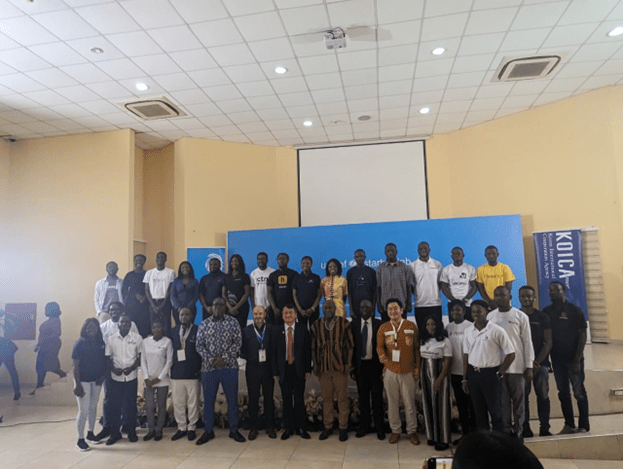Twenty start-ups across various industries have graduated from the third cohort of the UNICEF StartUp Lab Accelerator, securing GH¢500, 000 investment support to address the United Nations Sustainable Development Goals (SDGs) for children and young people in the country.
The programme which is led by UNICEF, in partnership with the Korean International Cooperation Agency (KOICA) and implemented by Meltwater Entrepreneurial School of Technology (MEST) equipped the nascent businesses with financial, technological, and communication skills of participating entrepreneurs, strengthening their product and businesses, and ultimately increasing their social impact over a six month period.
Speaking during the graduation and demonstration day ceremony, UNICEF Deputy Representative in Ghana, Fiachra McAsey said the ‘KOICA-UNICEF Accelerating Entrepreneurship and Innovation in Ghana Project’ has proven a critical tool in unearthing impact-focused businesses in the country.
“We continue to be inspired by this new cohort of talented startups, who are leveraging digital technology and their business acumen to build new products and services to tackle some of the most difficult challenges faced by young people in Ghana today. The 20 start-ups make up a cohort of resourceful, dedicated and talented individuals from across the country. It has been our pleasure to accompany them over the past six months through the UNICEF StartUp Lab Accelerator Programme, he said.
Mr. McAsey further expressed his anticipation of providing ongoing support to the participants as they become part of our Alumni network. He emphasised UNICEF’s commitment to assisting them in making a positive impact on the lives of children and young persons within and beyond Ghana’s borders.
The Acting Country Director of KOICA Ghana, Seungmin Oh noted highlighted the favourable synergy between the country’s pool of talented individuals addressing social and environmental challenges and the strong framework established by UNICEF. This informed KOICA’s decision to provide a grant totalling US$2.2 million from 2022 to 2026 to support social impact startups in Ghana.
“KOICA firmly believes in the transformative power of entrepreneurship and innovation. We recognize the importance of creating an enabling environment that fosters creativity, provides necessary resources, and encourages collaboration… We are proud to have been a part of the journey of the 20 startups, and we remain committed to supporting the growth of entrepreneurship and innovation in Ghana. We will continue to invest in programs that empower young entrepreneurs and equip them with the skills, resources, and networks needed to thrive in today’s competitive landscape,” he further stated.
This comes as Small and Medium Enterprises (SMEs) are poised to play a vital role in addressing the evolving requirements of Africa’s swiftly expanding population. With Africa’s working-age population projected to grow by 1.7 million individuals per month until 2030, and the urban population anticipated to double in the next 25 years, the significance of SMEs becomes even more pronounced.
Research & development
The Korean Ambassador to Ghana, Lim Jung-Taek was optimistic that the programme will spur innovation based on data-driven research for development.
Citing his home country as an example, he said: “South Korea has long been a testament to the power of technology-driven progress which has seen it invest more than 4 percent of its GDP in research and development, fuelling groundbreaking discoveries and fostering an environment that thrives on innovation.”
“This commitment to technological advancement has yielded incredible results, giving rise to global companies that have left an indelible mark on various industries,” he added.
This has propelled South Korea to the 10th largest economy in the world and the 4th largest economy in Asia, despite having the 27th largest population in the world.
In line with this objective, Professor Gordon A. Awandare, the Pro-Vice Chancellor overseeing Academic and Student Affairs at the University of Ghana, revealed the university’s commitment to allocate a piece of land for the Lab. He emphasized that the Lab’s central location within the university premises reflects the high regard and importance the university places on the impact it is driving.
Also, the UNICEF StartUp Lab Programme Manager at MEST, Gerhard Malah said, “As these entrepreneurs graduate from the program, we have full confidence in their ability to make significant strides in developing and refining their businesses, ultimately serving their communities in even more impactful ways.”
Graduands
The graduating startups include Loozeele Initiative (training and supporting young Kayayei); Brox Technology (students’ results checker); My Power App (safe, social connection platform for girls); Easimodation (sustainable real estate company); Nnoboa (agric-focused human resource company); NetLyfe (e- health platform); and Bethniel Financial Technology (financial services applications and tools).
Others are ViztaEdu (social media-based educational app for tertiary-level students); Chestify AI Labs (deep learning models to aid in diagnosing pathologies); Luminate Career Services (career guidance); ELNAK Recycle (textile waste management); Jowato (digital skills for small, rural, and household businesses);
EjumaHub (connecting independent handyman service professionals with customers); TrashSmart (digital waste management); and Heny (enabling the African gig economy).
The rest are CTN Technologies (STEM training in new technologies like 3D printing and robotics); AkoFresh (green cold chain solution to reduce postharvest losses); DeafCanTalk (video content in sign language and TV services for people with hearing disabilities); KoenaConcepts (Pan-African technology company); and GAPHealth (enterprise and patient-centred consumer software for digital health applications and research).










